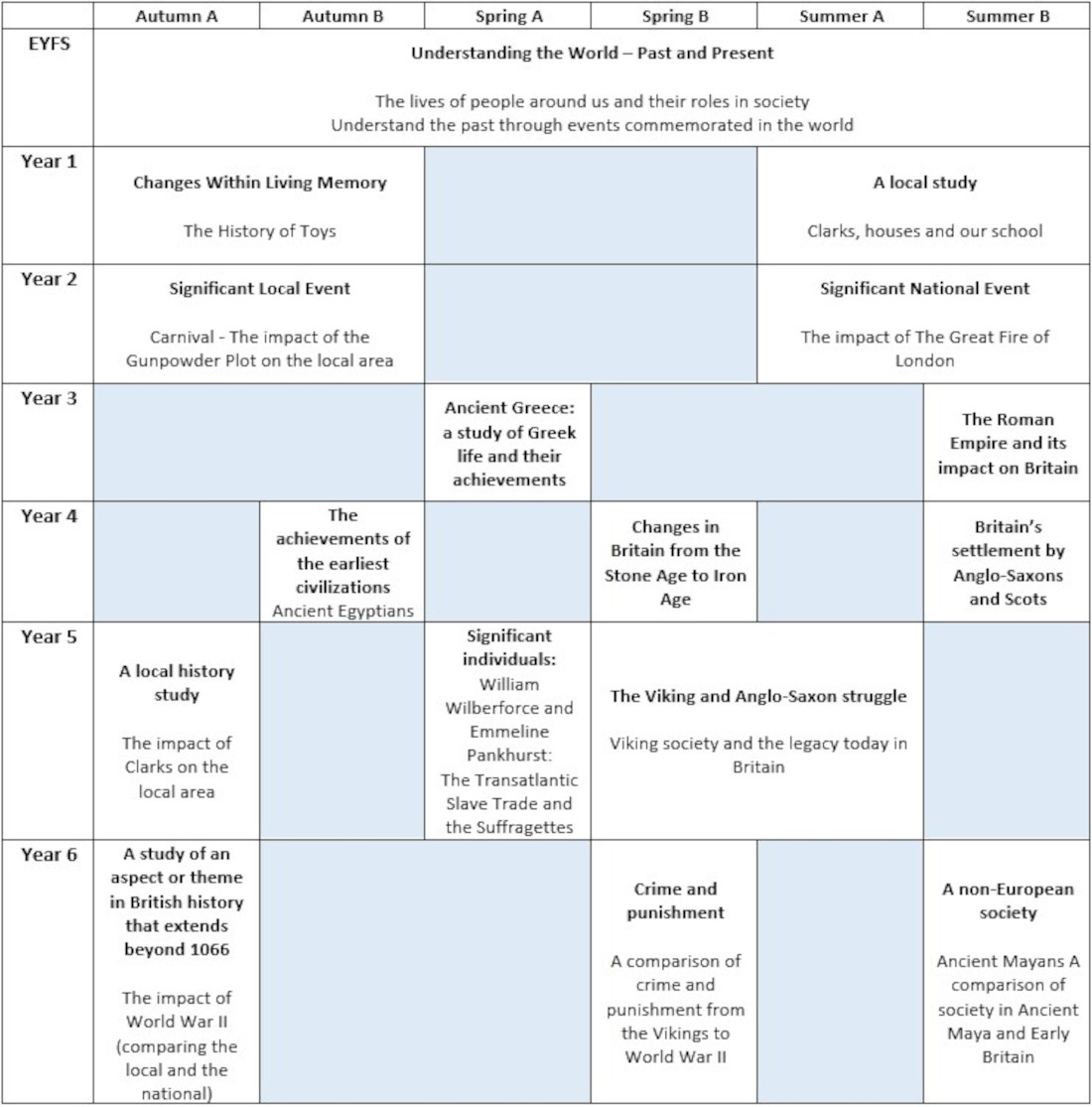History Curriculum
Intention
History has always been held in high regard at Brookside Academy. Street’s rich history, along with other aspects of our unique local area, is an inspiring and celebrated feature taught at our school. The history curriculum at Brookside Academy draws from and makes full use of the immediate and wider local area, enabling children to develop a deep understanding of the rich history of their locality. We aim to deliver a history curriculum that is accessible to all and that will maximise the outcomes for every child so that they know more, remember more and understand more.
Topics are informed by the national curriculum and are sensitive to children’s interests, as well as the context of the local area. The history curriculum at Brookside Academy is carefully planned and structured to ensure that current learning is linked to previous learning and that the school’s approaches are informed by current pedagogy. Children are helped to develop their chronological knowledge and understanding from the Stone Age to present day.
We want children to be curious to know more about the past and to have the skills required to explore their own interests and investigate different time periods. History lessons focus on working as historians and we aim to enable children to ask perceptive questions, think critically, weigh evidence, sift arguments, and develop perspective and judgement.
It is important for children to develop a sense of identity through learning about the past and we want them to understand how history has shaped their own lives. This is why the local area and its rich history is such an important part of our curriculum.
Implementation
History is taught in blocks throughout the year, so that children achieve depth in their learning. Teachers use a variety of teaching and learning styles in their history lessons to develop children’s knowledge, skills and understanding in history. At Brookside Academy our history curriculum is planned in line with the knowledge and skills outlined in the National Curriculum through KS1 and KS2. We cover each required topic of the national curriculum along with some additional topics which we believe enhance prior learning and encourage children to develop a love of history.
Our EYFS classes follow the Early Years Foundation Stage framework. ‘Understanding the World’ involves guiding children to make sense of their physical world and their community through opportunities to explore, observe and investigate people, places, technology and the environment.
As there is such a wealth of local history in Street, particularly involving the Quaker movement and the Clarks family, emphasis is placed on helping children to understand their local area. We look at how Street has been shaped over time so that children appreciate the unique history that is on their doorsteps.
We believe children learn best when:
- They have access to, and are able to handle artefacts
- They go on visits to museums and places of interest
- They have access to secondary sources such as books and photographs
- Visitors talk about personal experiences of the past
- They undertake fieldwork by interviewing family and older friends about changes in their own and other people’s lives
- They use drama to act out historical events
- They are shown, or use independently, resources from the internet and videos
- They are able to use non-fiction books for research
- They are provided with opportunities to work independently or collaboratively, to ask as well as answer historical questions.
We recognise that there are children of differing abilities in all our classes, and so we provide suitable learning opportunities for all children. We achieve this through a range of strategies which are differentiated by expected outcome and support from peers or adults.
Impact
Progress and attainment in History is demonstrated through regularly reviewing and assessments of children’s work.
This is achieved namely by:
- Looking at children’s work at different points throughout the year as they gain skills and knowledge
- Reviewing each year group’s Medium Term Planning
- Looking at subject formative data and teacher assessments
- Observing how children perform and interact in lessons
- Talking to children about what they know, including what they enjoy about History and different areas that are covered in it.
At Brookside Academy, we focus on observing and evaluating our end goals:
- Children foster a love and enthusiasm for History, showing interest in learning further about many aspects of the subject.
- As well as developing a secure understanding of historical content taught, children develop strong history based skills, using sources, enquiring, raising questions and investigating.
- Learning is progressive, investigative and reflective.
The impact of our History curriculum is measured by regular monitoring, observations and teacher assessment.
Curriculum Overview (Early Years - Year 6)

Quotes from pupils
“I like history because we get to learn fun things and we get to have a fun day.” – Ivy (Year 1)
“History is something that has already happened.” – Ella (Year 1)
“We’ve learned about things that have happened in the past that I never knew.” – Zachary (Year 2)
“I enjoyed learning about the Greek Gods.” – Roman (Year 3)
“We learn about things in the past.” – Isla (Year 3)
“I enjoy discovering what other people have discovered about the past.” – Naomi (Year 4)
“In Year 5, learning about the Vikings has been really fun and interesting.” – Lucas (Year 5)
“I like history because it teaches us about timelines that are very different than ours. History makes me feel like I'm going back in time.” – Poppy (Year 5)
“It’s interesting to learn about our country’s history.” – Lacey (Year 5)
“The Crime and Punishment topic was really different and interesting - unusual and different to other topics and lessons.” – William (Year 6)
